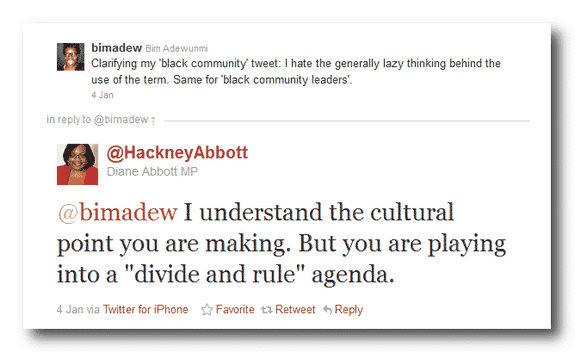The British Member of Parliament, Diane Abbott, was in hot water for her comments on Twitter recently which many people deemed to be racist. After several hours of criticism against her, the offensive Tweet was removed and Ms Abbott made a public apology. It was yet another example of the so-called “power of social media”. Of course, it was more about the power of data. People make all kinds of comments in bars and at dinner parties, but they don’t have to retract what they say because any complaining about what they say is relatively small, from one or two friends. Online, people get to see the true extent of the feelings against their views. In a bar, a single person might actually be voicing the views of a majority; but the person who makes offensive remarks has no way of knowing that – they only see the one complaint against them. But when they say the same things online, they can see the endless array of Tweets against them. Online, the extent of opposition to anyone’s viewpoint is made obvious by the amount of the Tweets or Facebook comments. Indeed, people even set up Facebook pages or groups to complain and make their views known.
Anyone who does say something controversial can be in no doubt as to the extent of the opposition against them, thanks to the obvious data in the numbers of people Tweeting, or the extent of Facebook opposition. It is not social media that has caused people to retract their negative views, but the weight of numbers – the data.
This is just an example of data available to us which prior to the Internet we could not collect – or at least not easily. Prior to the Internet, people could express all sorts of viewpoints – now they can see how offensive they have been. The extent of the information which we can collect is now massive. So much so it has been given its own name – “Big Data“. You can get information about the precise activities of your customers, your targets and prospects as well as all sorts of data on your competitors which was previously hidden to you, prior to the web.
Only recently a friend of mine attended a seminar where one of the speakers was from Amazon whose presentation focused on the fact that successful Internet marketing requires attention to detail of the data. Firms like Amazon know what you searched for, the books you have bought, what your friends have bought, what other people are searching for and what the competition is up to. Using complex software they aggregate all of this information to make it much more likely that they can offer you just what you want, at the precise time you want it. Try doing that with a bricks and mortar bookstore.
For companies the size of Amazon, collecting and analyzing all this data is not too much of a problem. But for the average business it is tough. Do you pay for specialist software to do all the number crunching? Expensive. Do you employ teams of people to analyze the information? Time consuming. Or do you outsource the data mining to experts in each sector? Tough to manage.
There is, in fact, so much data available to you that you could almost spend all of your day analyzing it so that you get to the minutest detail and find precise ways of targeting what you want to sell. But just because data is available does not mean you have to collect it or analyze it. There is a tendency within Internet marketing to try to ever more narrowly target and understand specific customer behaviour. But what you need to ask yourself is whether or not such analysis has a return on investment. Much of the analysis of “Big Data” is often futile – you can spend a lot of time and money analyzing the data for comparatively little return.
The only data you really need to know inside out is exactly what your customers want from you. And often it is not data that can tell you that – it is simply asking them.
In much the same way, if you were a British Member of Parliament it might be wise to ask people what they think of your viewpoint, before publicly declaring it on Twitter…!
Related articles
- Big Data Provides Insights from B2B Social Media (socialmediab2b.com)
- “Big Data” Often Isn’t Really, Says Bain (forbes.com)
- Big Data: Why All The Fuss? (informationweek.com)






Our Website: ===== www fashion-long-4biz com ====
Our main product list is as follows: